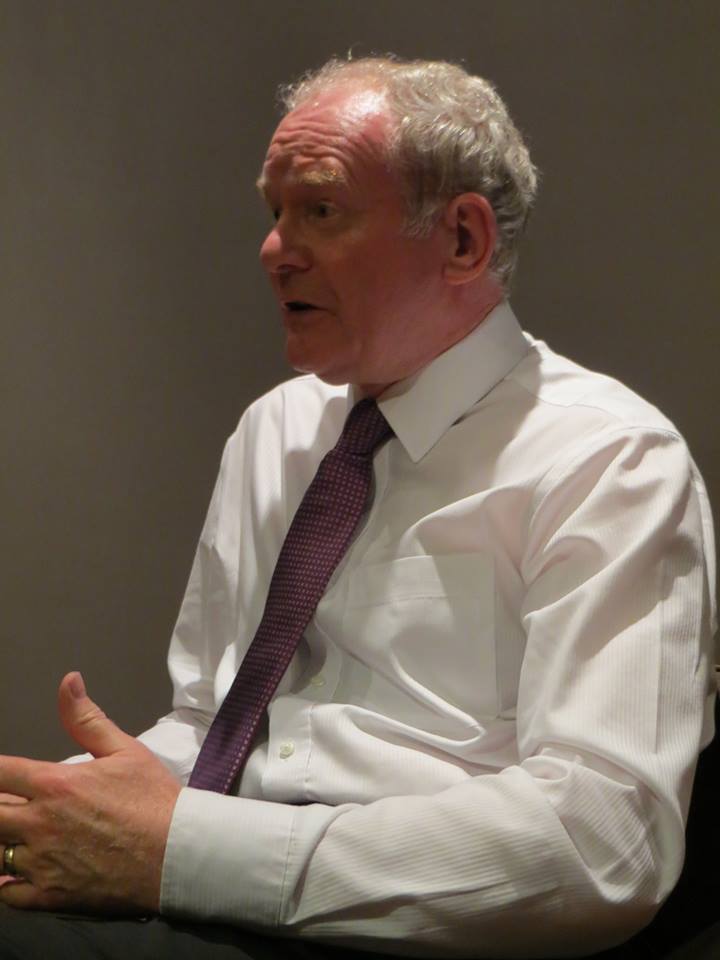Ingresa o regístrate acá para seguir este blog.
@radiobrendan
‘From war to peace: lessons from Ireland for Colombia.’
Thus ran the title of a talk Northern Ireland’s Deputy First Minister, Martin McGuinness, gave in Bogotá this week.

Belfast City: Not exactly a sea of tranquillity but much better than it was. Can Colombia learn from the Irish example?
The former IRA man, now very much in favour of the ballot box over the gun, is certainly well qualified to lecture on the subject.* And while Northern Ireland’s peace hits occasional stumbling blocks (it is a continuous process after all), there can be no disputing the fact that things are far brighter there these days since the protagonists decided to seriously ‘give peace a chance’. The odd verbal political fight, albeit frustrating at times, is much easier to take than bombing campaigns and tit-for-tat murders.
Given its relative success, it’s no surprise that the Irish case is held up as an example for other present-day conflicts to follow.
So coming back to the title of McGuinness’ talk, what are the lessons, if any, that Colombia can learn from the Northern Irish peace process?
For one, the fact that a process is actually in place and the parties to the conflict are talking must be highlighted as a good thing. (For the record, those at the peace negotiations are namely the Farc guerillas on the one hand and the government on the other, which not only stands for legitimate state security [and in theory the citizens] but also the paramilitaries whose actions were often allowed go unchecked by the powers that be.)
To this end, President Juan Manuel Santos and his administration deserve credit. You could be forgiven for thinking that there was no big risk in opening up talks, a natural step to take after decades of practically zero-sum warfare. Not here in Colombia, though. You’ll find that many who voted for Santos did so in the belief that he would follow the hard-line taken by his predecessor Álvaro Uribe: That effectively being ‘exterminate rather than communicate’.
For sure Colombians have reasons to be sceptical when it comes to peace talks with the Farc. There have been empty promises and false dawns before. Throw in the fact that these latest discussions are taking place without a ceasefire in operation and you can see why some question the legitimacy of the whole process. But generally, sitting down and talking with the ‘evil’ others is more productive over time than continuing with what amounts to an unwinnable war.
Also, in most conflicts there comes a moment when the struggle loses its appeal, its strength, and conditions become ripe for settlement. In the Northern Ireland case, the blueprint for peace was laid down as early as 1973 with the Sunningdale Agreement. However, for a large number on both sides of the divide, the timing wasn’t seen as right then; the warpath still seemed more favourable than the political one. It took another 25 years and plenty more coffins in the ground before the foundations of the current peace were agreed on – pretty much mirroring a lot of what was signalled in 1973. As the moderate Irish nationalist politician Seamus Mallon famously stated at the signing of the Good Friday (Belfast) Agreement in 1998, it was ‘Sunningdale for slow learners’.
For Colombia, the question must therefore be asked, are the conditions now ripe for a lasting settlement to be reached? Looking at it from a Farc point of view, where is the incentive for it to lay down its arms? Going ‘legit’ and becoming a political force could actually be akin to turning the gun on itself.
In this regard, the guerillas can point to the not-too-distant past and their flirtation with the democratic process via the Unión Patriótica (UP, Patriotic Union – a party which subsequently distanced itself from the rebels) in the 1980s. To say that this party was systematically annihilated by paramilitaries is an understatement. Add in the fact that the democratic right still rules at election time in this country and a politicised Farc, at this juncture in Colombia’s political story anyway, is unlikely to have much success at the polls.

Here to help: McGuinness speaking about the Colombian peace talks. (Picture credit: Steven James Grattan/Amy Farrell.)
Then, of course, you have the extremely lucrative global drugs business. It would be foolish not to think that for some guerillas, along with other underworld players, this is more important to ‘stay in the game’ for compared to any perceived revolutionary ideals.
McGuinness spoke of the international element to Northern Ireland’s peace process – the US assistance and the Independent International Commission on Decommissioning headed up by General John de Chastelain to name just two. Similarly, but to a far greater extent, any peace deal in Colombia will surely require a global strategy shift on another seemingly unwinnable war – the one being waged on drugs.**
This is something President Santos has previously highlighted. The key, of course, is finding an effective solution. On the ground here, for what it’s worth, McGuinness stressed what he felt was a genuine enthusiasm from those negotiating to come up with a meaningful deal.
Yet the cash cow of cocaine and other such drugs might literally blow up in their faces. For while the prospect of peace for Northern Ireland brought with it the chance of an economic upturn and a political high life for many of the players involved, McGuinness included, the opposite could well be the case for some of Colombia’s principal players in this conflict resolution quest.
As noted earlier, though, it’s better to be talking than burying heads in the sand.
However, if a peace deal is to be Santos’ legacy, he might just need at least another four years in office to realise that.
__________________________
*For a brief background on Martin McGuinness, see http://en.wikipedia.org/wiki/Martin_McGuinness.
**See also Colombia’s path to peace?, written when news of these latest peace talks was made public.
Facebook: Wrong Way Corrigan – The Blog.

